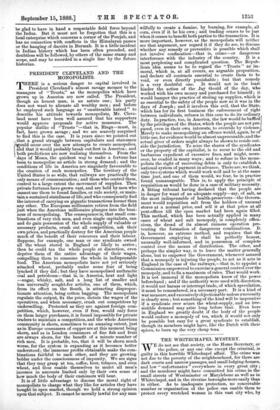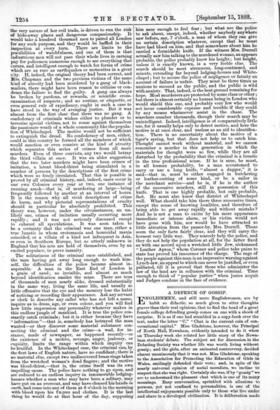THE WHITECHAPEL MYSTERY.
WE do not see that society, or the Home Secretary, or the police, or any one else except the criminal, is guilty in this horrible Whitechapel affair. The crime was not due to the poverty of the neighbourhood, for there are dark courts and narrow passages, and small lodging-houses, and low " unfortunates ' everywhere in every great city ; and the murderer might .have committed his crime in the small streets of Westminster or Marylebone as well as in Whitechapel, and in the riverine boroughs more easily than in either. As to inadequate protection, no conceivable number or organisation of the police can enable them to protect every wretched woman in this vast city who, by the very nature of her evil trade, is driven to run the risk of hide-away places and dangerous companionship. It would take a hundred. thousand men to patrol all London for any such purpose, and they would be baffled in their inspection at every turn. There are limits to the possibilities of watchfulness, and one of them is that industrious men will not pass their whole lives in earning pay for policemen numerous enough to see everything that cocurs, and intelligent enough to watch for forms of crime which are as rare as earthquakes or meteorites in a great city. If, indeed, the original theory had been correct, and Mrs. Chapman and the two previous victims of the same kind of atrocity had been murdered by a gang of black- mailers, there might have been reason to criticise or con- demn the failure to find the guilty. A gang can always be broken by pardons, or rewards, or scientific cross- examination of suspects ; and no routine, or etiquette, or even general rule of expediency, ought in such a case to have stood in the way of avenging justice. But it was almost from the first dear that there was no gang. A confederacy of criminals wishes either to plunder or to terrorise special victims, not to rouse against themselves the passionate wrath of a whole community like the popula- tion of Whitechapel. The motive would not be sufficient to extinguish the dread. No confederacy of men, either, could in this country be formed all the members of which would sanction or even connive at the kind of atrocity which separates this series of crimes from all mere murders. Even of three convicts, any two would betray the third villain at once. It was an abler suggestion that the two later murders might have been crimes of imitation, a latent blood-thirst being stimulated in a number of persons by the descriptions of the first crime which were so freely circulated. That this is possible is proved by all criminal history, and, indeed, cases occur in our' own Colonies every year or two, one instance of running amok—that is, of murdering at large—being frequently followed by another at an interval of hours. It is the reason why all vivid descriptions of crime do harm, and why pictorial representations of cruelty should in particular be absolutely prohibited. This theory was, however, under the circumstances, an un- likely one, crimes of imitation usually occurring more rapidly ; and it was not seriously discussed except to exhaust all speculations. It was soon taken to be a certainty that the criminal was one man, either a true lunatic in whom erotomania and homicidal mania coincided, or a villain of a kind not infrequent in Asia, or even in Southern Europe, but so utterly unknown in England that his acts are held of themselves, even by an excited populace, to prove insanity.
The solitariness of the criminal once established, and the man having got away long enough to wash him- self, the difficulties of the police became almost in- superable. A man in the East End of London is a grain of sand; as invisible, and almost as much beyond identification amidst the mass. There are tens of thousands of men nearly alike, dressed substantially in the same way, living the same life, and usually so little offensive that the eye and the memory lose the habit of noticing or recording their appearance. Ask any servant or clerk to describe any caller who has not left a name, inquire as to dress, age, or even colour, and you will find how little impression any personality whatever makes in this endless jungle of mankind. It is true the police con- stantly catch criminals ; but it is either because they have " information "—that is, somebody has betrayed the man wanted—or they discover some material substance con- necting the criminal and the crime—a wad, for in- stance, made of newspaper, as happened recently—or the existence of a motive, revenge, anger, jealousy, or cupidity, limits the range within which inquiry can be fruitful. In the Whitechapel case, the criminal can, by the first laws of English nature, have no confidant ; there is no material clue, except two undiscovered brass rings taken from the wretched woman's dead fingers ; and the motive was blood-thirst,—that is, the crime itself was its own impelling cause. The police have nothing to go upon, and are reduced to an endless inquiry in innumerable lodging- houses whether a man who may have been a solitary, may have put on an overcoat, and may have cleaned his hands in earth, had come into any of them at 6 o'clock in the morning with blood upon his f ngers and clothes. It is the last thing he would do at that hoar of the day, supposing him sane enough to feel fear ; but what are the police to ask about, except, indeed, whether anybody anywhere saw before, say, 7 o'clock, a man of whom they can give no certain description whatever, except that he must have had blood on him, and that somewhere about him he carried a formidable knife. If the witness Mrs. Durrell actually saw him talking to the murdered woman, as appears probable, the police probably know his height; but height, unless it is exactly known, is a very feeble clue. The search should be most strenuous, long-continued, and minute, extending far beyond lodging-houses and White- chapel ; but to accuse the police of negligence or fatuity on account of failure is unfair. They must be three times as anxious to succeed as the public, and the public is wild with anxiety. That, indeed, is the best ground remaining for hope. Most murderers are protected by some class or other ; but there is almost certainly no human being in London who would shield this one, and probably very few who would not incur considerable expense and trouble if they could by any means whatsoever assist in the chase. The searchers number thousands, though their search may be unintelligent. Indeed, intelligence is of comparatively little use, for it usually helps only to detect motive, and here the motive is at once dear, and useless as an aid to identifica- tion. There is no uncertainty about the motive of a tiger's spring, but that does not help us to catch him. Thought cannot work without material, and we cannot remember a murder in this generation in which the materials for thought were so few, while they are all disturbed by the probability that the criminal is a lunatic in the true professional sense. If he is sane, he must, in all human probability, be a man accustomed to carry or use a long knife, " almost a dagger," it is said—that is, must be either engaged in butchering or leather-cutting of some kind, or be a sailor in the merchant service—and he is, if he is the author of the successive murders, still in possession of this knife. That is one highly probable, but only probable, fact. He must also know that district of Whitechapel well. What should take him there three successive times, except the sense of knowing localities, and therefore of being able to get away rapidly and without mistake ? And he is not a man to excite by his mere appearance immediate or intense alarm, or his victim would not have gone with him, nor would he have attracted so little attention from the passer-by, Mrs. Durrell. Those seem the only facts fairly clear, and they will carry the keenest very little way. They scarcely help the police, and they do not help the population at all, for the latter fixed as with one accord upon a wretched little Jew, nicknamed. " Leather Apron," whom Coroner and police take pains to state has proved his innocence of the charge. The rage of the people against this man is an impressive warning against Lynch-law, an appeal to which can never be justified, or' even palliated, till it is proved that those who administer the law of the land are in collusion with the criminal. Time enough to think of "popular justice" when juries acquit and Judges condone in the face of evidence.



































 Previous page
Previous page